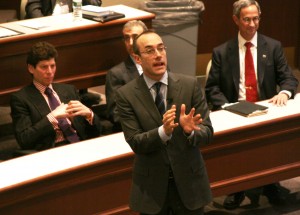In conjunction with National Entrepreneurship Week, Dan Senor, the co-author of the New York Times best-seller “Start-Up Nation: The Story of Israel’s Economic Miracle,” was invited to campus as the keynote speaker.
Despite Senor’s many professions — he was also a geopolitical expert, an investor and an Adjunct Senior Fellow for Middle East Studies at the Council on Foreign Relations — it was his book that took center stage on the evening of Wednesday, Feb. 23, at the Simon Graduate School of Business.
It was 7 p.m. when Room 318/418 started to fill up with students, alumni and professors alike. Senor and UR President Joel Seligman arrived straight from the reception at the Eisenburg Rotunda held an hour earlier.
The talk started with an introduction by President Seligman, who praised Senor for capturing the nature of innovation of the University in his book, before light-heartedly making a pitch for Senor’s book to the audience.
“We are determined to help revitalize Rochester, and this means focusing on start-ups and tech transfers in the broader sense,” Seligman said. “We’re working in the partnership that Dan Senor describes on a national basis in Israel [which is] the future of Rochester.”
Delving into the heart of the evening’s topic, Senor spoke of Israel’s economic progress, which has rivaled that of many advanced countries in the world, including the United States. Israel also has the highest density of start-ups in the world, a point which Senor’s book specifically focuses on.
Given the tumultuous condition Israel has found itself in over the past two decades, people have became increasingly interested in Israel’s success story. Senor and his co-author, Saul Singer, were among those people.
“We get the story, but we were interested in the ‘how’ — how did Israel pull this off, in the least likely of places, surrounded by adversaries, in a state of war [with] no real access to natural resources?” Senor said.
When the nation was hit by the economic downturn, people began to ask what went wrong, and if they could then “invent” their way back, returning to their entrepreneurial roots.
In Senor’s opinion, Israel, which he called “the quintessential start-up nation,” holds the answer as it is considered to have one of the most innovation-based economies today.
He attributed Israel’s economic success to roles played by immigration and the military in shaping the innovation and persistence of the nation.
Immigrants, he thought, were exemplary entrepreneurs while the military provided the people with leadership training and experience.
Just as the book had provoked a wide range of responses, there was also no shortage of dialog regarding Senor’s visit to the University and the subject of the lecture.
Among the issues raised were Senor’s involvement with the Iraq War and the controversy surrounding Israel’s relations with America and Palestine.
At the question and answer session after, senior Maya Dukmasova brought up the issue of the Gaza blockade while junior Boian Boianov stayed after the event to hand out information flyers on Israel’s exploitation of Palestine.
“His book is a how-to for corporate America, not about Israeli economics,” Boianov said.
Freshmen Zhao Li and Xiao Yang, who are both from China, thought the focus on economic achievements of a country ignores the issue of human rights, which they felt should have been the center of the Israel Peace Week.
Israel Council also came under fire for co-sponsoring the talk during their Peace Week, with people questioning their support of a right-wing and pro-war figure.
“We’ve been generally giving the response that we support Israel’s economy, and we think that it’s something that doesn’t get shown a lot in the media,” Israel Council co-president and sophomore Stefanie Milner said.
“We’re supporting this knowledge of a peaceful Israel being communicated to the world. [Senor] is not here to give a speech about politics. [His political views] do not necessarily reflect ours.”
On whether Senor himself was prepared for the tough questions from the audience that evening, he replied that he was happy to address the range of issues, having spoken all over the world.
“I think Rochester represents a really exciting and interesting opportunity for this part of the state and this part of the country,” Senor said. “[This city] has many elements of a natural economic cluster that Israel has, not the least of which is a vibrant University right here, the key ingredient for a successful cluster.”
Lim is a member of
the class of 2014.


